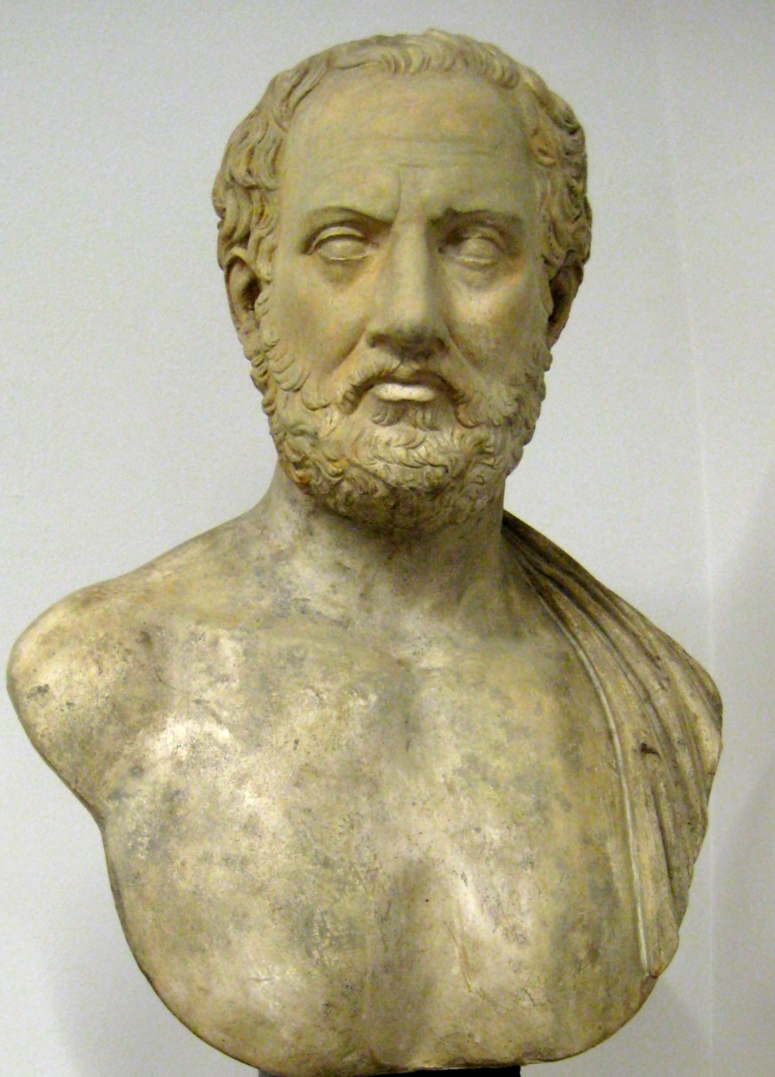Variant translations:<p>But the palm of courage will surely be adjudged most justly to those, who best know the difference between hardship and pleasure and yet are never tempted to shrink from danger. http://www.perseus.tufts.edu/cgi-bin/ptext?lookup=Thuc.+2.40.3<p>And they are most rightly reputed valiant, who though they perfectly apprehend both what is dangerous and what is easy, are never the more thereby diverted from adventuring. (translation by Thomas Hobbes http://oll.libertyfund.org/?option=com_staticxt&staticfile=show.php%3Ftitle=771&chapter=90127&layout=html&Itemid=27)<p>
Book II, 2.40-[3]
History of the Peloponnesian War, Book II
Works

History of the Peloponnesian War
ThucydidesFamous Thucydides Quotes
“they possess most gold and silver, by which war, like everything else, flourishes.”
Book VI, 6.34; "they have abundance of gold and silver, and these make war, like other things, go smoothly" ( trans. http://www.classicpersuasion.org/pw/thucydides/jthucbk6rv2.htm Benjamin Jowett)
History of the Peloponnesian War, Book VI
“Contempt for an assailant is best shown by bravery in action.”
Book VI, 6.34-[9]; "the true contempt of an invader is shown by deeds of valour in the field" ( trans. http://www.classicpersuasion.org/pw/thucydides/jthucbk6rv2.htm Benjamin Jowett)
History of the Peloponnesian War, Book VI
Variant translation: "...the search for truth strains the patience of most people, who would rather believe the first things that come to hand." Translation by Paul Woodruff.
Book I, 1.20-[3]
History of the Peloponnesian War, Book I
Thucydides Quotes about war
“war is a matter not so much of arms as of money”
Book I, 1.83-[2]
History of the Peloponnesian War, Book I
Book I, 1.144-[3]
Variant translation: We must realize, too, that, both for cities and for individuals, it is from the greatest dangers that the greatest glory is to be won.
As translated by Rex Warner (1954).
History of the Peloponnesian War, Book I
Book I, 1.78-[3]
History of the Peloponnesian War, Book I
Book VII, 7.28-[3]
History of the Peloponnesian War, Book VII
Book VII, 7.44-[1]
History of the Peloponnesian War, Book VII
Variant translation: "People always think the greatest war is the one they are fighting at the moment, and when that is over they are more impressed with wars of antiquity; but, even so, this war will prove, to all who look at the facts, that it was greater than the others." Translation by Paul Woodruff.
Book I, 21-[2]
History of the Peloponnesian War, Book I
Thucydides Quotes about men
Book VI, 6.18-[2]
History of the Peloponnesian War, Book VI
Book V, 5.105-[2]
History of the Peloponnesian War, Book V
Book IV, 4.92-[7]
History of the Peloponnesian War, Book IV
Book VII, 7.66-[3]
History of the Peloponnesian War, Book VII
Book III, 3.45-[1]
History of the Peloponnesian War, Book III
Book II, 2.35-[1]-[3]
History of the Peloponnesian War, Book II
Context: I could have wished that the reputations of many brave men were not to be imperilled in the mouth of a single individual, to stand or fall according as he spoke well or ill. For it is hard to speak properly upon a subject where it is even difficult to convince your hearers that you are speaking the truth. On the one hand, the friend who is familiar with every fact of the story may think that some point has not been set forth with that fullness which he wishes and knows it to deserve; on the other, he who is a stranger to the matter may be led by envy to suspect exaggeration if he hears anything above his own nature. For men can endure to hear others praised only so long as they can severally persuade themselves of their own ability to equal the actions recounted: when this point is passed, envy comes in and with it incredulity.
Thucydides: Trending quotes
“I am more afraid of our own blunders than of the enemy's devices.”
Book I, Chapter V
History of the Peloponnesian War, Book I
Book I, 1.23-[6]. (See: Thucydides Trap https://en.wikipedia.org/wiki/Thucydides%20Trap)
History of the Peloponnesian War, Book I
Thucydides Quotes
Book II, 2.40-[3]
History of the Peloponnesian War, Book II
Context: Again, in our enterprises we present the singular spectacle of daring and deliberation, each carried to its highest point, and both united in the same persons; although usually decision is the fruit of ignorance, hesitation of reflection. But the palm of courage will surely be adjudged most justly to those, who best know the difference between hardship and pleasure and yet are never tempted to shrink from danger. In generosity we are equally singular, acquiring our friends by conferring, not by receiving, favours.
Book II, 2.40-[3]
History of the Peloponnesian War, Book II
Context: Again, in our enterprises we present the singular spectacle of daring and deliberation, each carried to its highest point, and both united in the same persons; although usually decision is the fruit of ignorance, hesitation of reflection. But the palm of courage will surely be adjudged most justly to those, who best know the difference between hardship and pleasure and yet are never tempted to shrink from danger. In generosity we are equally singular, acquiring our friends by conferring, not by receiving, favours.
“Ignorance produces rashness, reflection timidity”
Book II, 40.3
History of the Peloponnesian War, Book II
“I have often before now been convinced that a democracy is incapable of empire…”
Book III, 3.37-[1] (Speech of Cleon..).
History of the Peloponnesian War, Book III
Book IV, 4.17-[4]
History of the Peloponnesian War, Book IV
Book III, 3.39-[3]
History of the Peloponnesian War, Book III
Book VII, 7.57-[1]
History of the Peloponnesian War, Book VII
“here we bless your simplicity but do not envy your folly.”
Book V, 5.105-[3]
History of the Peloponnesian War, Book V
Book I, 21-[1]
History of the Peloponnesian War, Book I
A summary of Athenian statements to the Melians, Book V, 5.89-[1]
History of the Peloponnesian War, Book V
Book VI, 6.22-[1]
History of the Peloponnesian War, Book VI
Book I, 1.1-[1] (opening lines...)
History of the Peloponnesian War, Book I
Book VII, 7.71-[3] (See also: Fog of war..).
History of the Peloponnesian War, Book VII
Book V, 5.69-[2]
History of the Peloponnesian War, Book V
Book III, 3.46-[4]
History of the Peloponnesian War, Book III
Book I, 1.34-[3]
History of the Peloponnesian War, Book I
“the freaks of chance are not determinable by calculation.”
Book I, 1.84-[3]
History of the Peloponnesian War, Book I
Book I, 1.13-[1] (See also: Karl Marx, Grundrisse, Introduction p. 7)
History of the Peloponnesian War, Book I
Book VI, 6.23-[2]
History of the Peloponnesian War, Book VI
Book VII, 7.75-[3]
History of the Peloponnesian War, Book VII
Book I, 1.42-[3]
History of the Peloponnesian War, Book I
Book VIII, 8.96-[5]
History of the Peloponnesian War, Book VIII
Book II, 2.64-[5]
History of the Peloponnesian War, Book II
Book V, 5.111-[4]
History of the Peloponnesian War, Book V
Book III, 3.82-[4]
History of the Peloponnesian War, Book III
“Now the only sure basis of an alliance is for each party to be equally afraid of the other;”
Book III, 3.11-[2]
History of the Peloponnesian War, Book III
“They stood where they stood by the power of the sword.”
Book IV, 4.98-[7]
History of the Peloponnesian War, Book IV
Book I, 1.8-[3]
History of the Peloponnesian War, Book I
Book VII, 7.68-[3]
History of the Peloponnesian War, Book VII
Book V, 5.103-[1]
History of the Peloponnesian War, Book V
Book I, 1.23-[6].
History of the Peloponnesian War, Book I
Book III, 3.22-[7]-[8] (See also: Spoofing attack..).
History of the Peloponnesian War, Book III
“self-control contains honour as a chief constituent, and honour bravery.”
Book I, 1.84; "self-control is the chief element in self-respect, and respect of self, in turn, is the chief element in courage" ( trans. Charles Forster Smith https://archive.org/stream/thucydideswithen01thucuoft/thucydideswithen01thucuoft#page/142/mode/2up)
History of the Peloponnesian War, Book I
“he who voluntarily confronts tremendous odds must have very great internal resources to draw upon.”
Book II, 2.89-[6].
History of the Peloponnesian War, Book II
Book VII, 7.12-[3]-[4]
History of the Peloponnesian War, Book VII
Book II, 2.62-[4]-[5]
History of the Peloponnesian War, Book II
Variant translation: "Instead, we think the plans of our neighbors are as good as our own, and we can't work out whose chances at war are better in a speech. So we always make our preparations in action, on the assumption that our enemies know what they are doing. We should not build our hopes on the belief that they will make mistakes, but on our own careful foresight. And we should not think there is much difference between one man and another, except that the winner will be the one whose education was the most severe." Translation by Paul Woodruff.
Variant translation: "There is no need to suppose that human beings differ very much from one another: but it is true that the ones who come out on top are the ones who have been trained in the hardest school." Note: Some versions omit the "who have been".
Book I, 1.84-[4]
History of the Peloponnesian War, Book I
Book I, 69.
History of the Peloponnesian War, Book I
Book IV, 4.62-[3]-[4]
History of the Peloponnesian War, Book IV
“The secret of happiness is freedom and the secret of freedom is courage.”
Book II, 2.43
History of the Peloponnesian War, Book II
Book I, 1.22-[4]
History of the Peloponnesian War, Book I
Book IV, 4.59-[2]; "Nobody is driven into war by ignorance, and no one who thinks that he will gain anything from it is deterred by fear." ( trans. http://www.classicpersuasion.org/pw/thucydides/thucydides-passages.php?pleaseget=4.59-64 Benjamin Jowett)
History of the Peloponnesian War, Book IV
Book I, 1.140-[5]
History of the Peloponnesian War, Book I
Book VIII, 8.89
As quoted in A Historical Commentary on Thucydides: A Companion to Rex Warner’s Penguin Translation, David Cartwright/Rex Warner, University of Michigan Press (1997), p. 298 : ISBN 0472084194
In the Richard Crawley translation, this quote is rendered as follows : [U]nder a democracy a disappointed candidate accepts his defeat more easily, because he has not the humiliation of being beaten by his equals.
History of the Peloponnesian War, Book VIII
Book VII, 7.29-[4]
History of the Peloponnesian War, Book VII
Book II, 99,-[3]
History of the Peloponnesian War, Book II
Book III, 3.10-[2]
History of the Peloponnesian War, Book III
Book IV, 4.108-[4]
History of the Peloponnesian War, Book IV
Book II, 2.40-[3]
History of the Peloponnesian War, Book II
“speculation is carried on in safety, but, when it comes to action, fear causes failure.”
Book I, 1.121-[5]
History of the Peloponnesian War, Book I
